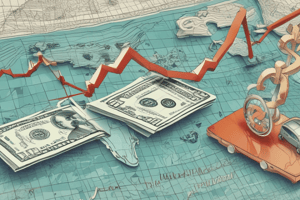Podcast
Questions and Answers
How do higher interest rates typically affect the demand for a currency?
How do higher interest rates typically affect the demand for a currency?
- They decrease demand due to increased borrowing costs.
- They weaken the currency by increasing outflows.
- They attract foreign investment, thereby increasing demand. (correct)
- They have no significant impact on currency demand.
What is the impact of inflation on currency values?
What is the impact of inflation on currency values?
- High inflation causes currency appreciation.
- High inflation erodes purchasing power, leading to depreciation. (correct)
- Inflation has no measurable effect on currency stability.
- Low inflation typically erodes currency value.
In terms of trade balances, what happens when a country has a trade deficit?
In terms of trade balances, what happens when a country has a trade deficit?
- The trade deficit creates a strong demand for foreign currencies.
- The currency remains stable regardless of the trade situation.
- The currency weakens as imports exceed exports. (correct)
- The currency tends to appreciate.
Which scenario typically leads to a stronger currency in the forex market?
Which scenario typically leads to a stronger currency in the forex market?
How does market sentiment typically influence currency strength?
How does market sentiment typically influence currency strength?
Which factor relates to how commodity prices influence currency value?
Which factor relates to how commodity prices influence currency value?
What is the likely result of monetary policy divergence between two countries?
What is the likely result of monetary policy divergence between two countries?
How does economic growth affect the value of a currency?
How does economic growth affect the value of a currency?
What roles do inflation indices like CPI and PPI play for forex traders?
What roles do inflation indices like CPI and PPI play for forex traders?
What is a primary consequence of unstable political conditions on currency values?
What is a primary consequence of unstable political conditions on currency values?
Flashcards
Interest Rate Differentials
Interest Rate Differentials
Changes in interest rates between countries influence currency values. Higher rates attract investment, strengthening the currency. Lower rates weaken it.
Impact of Inflation on Currency
Impact of Inflation on Currency
Low inflation generally strengthens a currency due to stable purchasing power. High inflation weakens a currency due to reduced purchasing power.
Economic Growth and Currency Value
Economic Growth and Currency Value
Strong economic growth attracts investment leading to currency appreciation.. Weak growth or unemployment can weaken the currency.
Trade Balances and Exchange Rates
Trade Balances and Exchange Rates
Signup and view all the flashcards
Political Stability's Effect
Political Stability's Effect
Signup and view all the flashcards
Market Sentiment and Currencies
Market Sentiment and Currencies
Signup and view all the flashcards
Monetary Policy Divergence
Monetary Policy Divergence
Signup and view all the flashcards
Commodity Price Influence
Commodity Price Influence
Signup and view all the flashcards
Study Notes
Macroeconomic Factors in Forex Markets
-
Interest Rate Differentials:
- Central banks adjust interest rates to manage inflation and growth.
- Higher interest rates attract foreign investment, increasing currency demand and appreciation.
- Lower interest rates weaken a currency.
- Example: Higher USD rates tend to strengthen the dollar, impacting imports from countries like Japan, raising costs for them.
-
Inflation:
- Low inflation economies typically show currency appreciation due to consistent purchasing power.
- High inflation weakens a currency, leading to depreciation.
- Inflation data (e.g., CPI, PPI) are key indicators for forex traders.
-
Economic Growth and Employment:
- Strong GDP growth attracts investment, boosting currency value.
- Weak growth or high unemployment can depreciate a currency.
- Economic data releases (e.g., US Non-Farm Payrolls) are closely watched by forex traders.
-
Trade Balances:
- Trade surplus (exports more than imports) strengthens currency.
- Trade deficit (imports more than exports) weakens currency.
- Countries with consistent surpluses (e.g., China, Germany) often have strong currencies.
- Example: If Japan imports more USD goods, this raises USD demand, strengthening the USD.
-
Political Stability and Geopolitical Events:
- Stable governments and predictable policies attract investors, bolstering currencies.
- Wars, unrest, policy changes (like Brexit) cause forex volatility.
-
Market Sentiment and Risk Appetite:
- "Risk-on" environments (optimism) boost high-yield currencies (e.g., AUD).
- "Risk-off" environments (pessimism) strengthen safe-haven currencies (e.g., USD, JPY, CHF).
-
Monetary Policy Divergence:
- Differences in monetary policies between countries create forex movement.
- Example: One country tightening while another maintains low rates influences investor decisions.
-
Commodity Prices:
- Currency fluctuations in commodity-exporting countries often mirror global commodity prices.
- Example: Lower oil prices weaken CAD (Canadian Dollar), while higher gold prices may strengthen AUD (Australian Dollar).
Studying That Suits You
Use AI to generate personalized quizzes and flashcards to suit your learning preferences.




